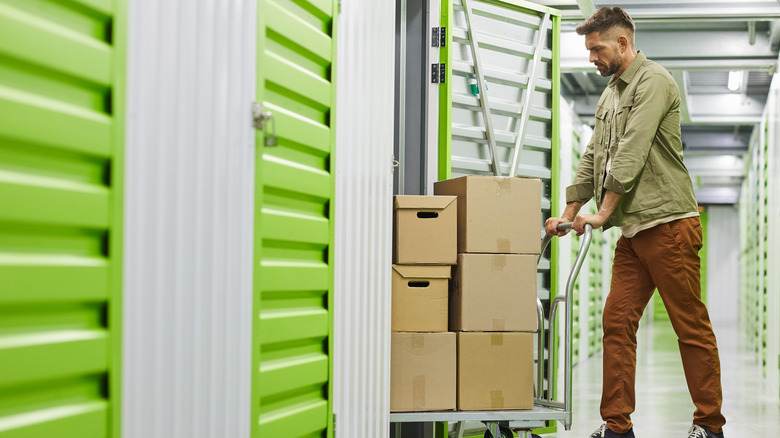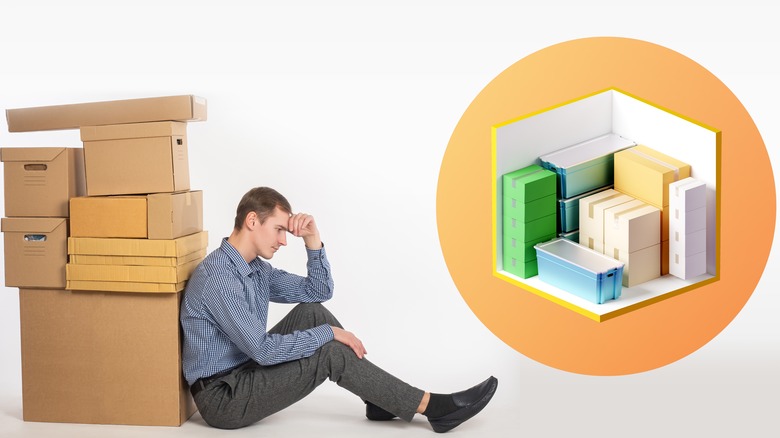Mistakes To Avoid When Renting A Storage Unit
There are a billion and one reasons why anyone could need a storage unit. More specifically, temporary downsizing, safety, and a need to preserve items are some of the drivers behind the super speedy growth of the self-storage facility industry, which has an annual estimated revenue of more than $39.5 billion (via Neighbor). These figures also indicate renting a storage container is expensive. Per Move, the average cost of renting a medium-sized unit is $180 — and this figure can go considerably higher if you need a larger space.
Considering the price tag, it's important to get the most bang for your buck. After all, you don't want to do business with a fly-by-night company that auctions off your stuff based on a document you signed unknowingly. It might seem unlikely, but there are multiple ways to go wrong when renting storage units. Furthermore, self-storage facilities don't typically refund rental costs. Indeed, once the papers are signed, it's a done deal. This article covers the major mistakes to avoid when renting a storage unit.
Not planning ahead
When it comes to renting self-storage space, a lot of planning is required to avoid various problems. For one thing, make sure to find an affordable unit with plenty of space that's located nearby. With these facts and more in your hands, you won't have to depend on the salesman's knowledge to know what unit size is most advantageous.
Life Storage advises prospective renters to consider what the space will be used for, note how many boxes will be needed, and use a tape rule to measure the unit. Meanwhile, Move suggests multiplying the length and width of your belongings to determine the ideal square footage. Just be sure to leave extra room for easy access, and remember: Getting a bigger unit is more advantageous than a smaller space. Another mistake that can happen due to poor planning is not making sure your stuff will actually fit into the moving vehicle.
If you have heavy belongings, get assurances that your movers and storage unit can handle the load. Another common mistake to avoid is not planning what to use for packing material ahead of time. MetroMovers advises against using newspapers, as they can stain your belongings. Instead, use bubble wrap. You should also clearly label all boxes, which will make things easier to find when needed.
Not considering how and where
One of the most common mistakes made by storage unit renters is not considering how and where they'll store their items. According to SimplyStoring, some people have no idea what to place on the floor and end up stockpiling expensive and/or fragile items there, which could easily cause damage. This is especially important to consider if you live in an area that experiences a lot of rainfall, as your belongings will be much safer on a plastic or wooden pallet.
Additionally, make sure to only house items that can survive getting wet or other weather elements. They also need to be packed in a way that protects them from pests. Security Public Storage says while standard pest prevention practices are a great way to keep away these nuisances, you should also only use well-sealed containers and never store food in a storage unit.
If you own items that can be damaged by extreme changes in temperature or humidity, it's prudent to get a climate-controlled unit to ensure nothing gets damaged. Extra Space Storage explains that climate-controlled storage units protect items made of wood, fabric, and metal, as well as electronic devices, and even prevent mildew and mold. If your possessions are temperature-sensitive and valuable, they could be irreparably damaged in a normal self-storage facility.
Focusing only on the price
Without a doubt, price should be one of your top considerations before signing any contract. After all, when it comes to any purchase, you get what you pay for. Case in point: A same-size unit that rents for $30 per month versus one that runs for $100 per month will definitely be of lesser quality. Now, this doesn't mean good deals don't exist. Instead, consider multiple options, ask questions, consider various factors, and ensure your basic needs will be met before allowing price to be a deciding factor.
So, what details should you consider before pricing? According to Stow Simple, security should be at the top of your list. If the overall facility doesn't have alarms, video surveillance, on-site security staff, fences, and gates that require authorization to enter, it isn't secure enough and you should consider finding a different option. Storable suggests finding a storage unit with keyless smart entry locks to offer full protection.
Finally, another important thing to consider is insurance. According to Forbes, most self-storage facilities mandate certain coverages, but some less reputable companies may not always provide all the necessary information until you've already signed on the dotted line. If a certain facility doesn't mention insurance as a requirement, take this as a hint that management doesn't have your best interests in mind.
Renting based on pictures or videos alone
Before signing any contract, another way to make multiple mistakes through a single action is to rent a storage space online — without ever seeing it in person. Of course, this could turn out badly for you because plenty of businesses claim to be a lot of things they're not. Plus, photos and videos can be easily manipulated. ScamBusters says one of the most common fraudulent practices is people renting storage units that they are told are clean and secure, but turn out to be neither.
What's more, renting a unit online may not provide all the same discounts and offers you would receive if you did so in person, especially if the first month is discounted. The sale price often pushes people to act much faster than they initially planned, which can be dangerous for something they've neither seen nor inspected. Being too quick to grab an offer can mean glossing over the fine details. To that end, Golan's Moving & Storage says it's important to comb through your entire contract.
One final reason to rent in person is so you can get to know at least one member of the company personally. This is important because, either through negligence or direct involvement, operators have been known to play a part in the theft of contents from locked units (via GoLocalProv). This might sound scary, but remember proper research and following safety tips can help you avoid such scenarios.
Overlooking location
Failing to consider location could be a costly mistake. Abacus Self Storage suggests finding a facility close to your home for convenience and easy access. If your unit mostly houses documents, choosing a location miles away from home or your office can steal valuable time. During the drive or walk there, consider if making the journey repeatedly is worth it.
Another common mistake is not considering access. According to BlueMountain Self Storage, some storage facilities have limited hours as a safety measure. While your belongings are protected, there may be times when you, the owner, won't be able to access your belongings. So, consider hours of operation and ensure they work for you.
You should also take the time to assess the overall facilities to make certain the advertised features match reality. If a self-storage company promises security, but you're able to walk right in without any checks, chances are your unit won't really be secure. Pro tip: When visiting a place you've previously never visited, Golan's Moving and Storage advises researching the legitimacy of the company. It's also a great idea to go with someone you know, just to be safe.





